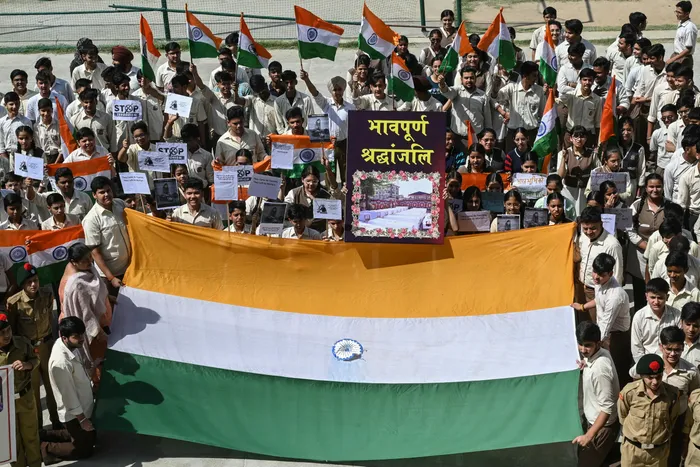
Pupils hold placards and an Indian flag during a protest march against the Pahalgam tourist attack.
Image: Narinder NANU / AFP
THE killing of Pahalgam tourists targeting Hindus is a continuation of ethnic cleansing of Hindus in Kashmir.
On April 22, 26 civilians, including Hindu pilgrims and tourists, were killed in a brutal attack, carried out by heavily armed militants believed to be linked to Pakistan-based terror group Lashkar- e-Taiba (LeT). Inevitably this blood-soaked massacre of the innocent civilians has exacerbated communal and political tensions in the region.
India has accused Pakistan of harbouring and supporting terror groups responsible for carrying out such attacks, escalating already fraught relations. Prime Minister Narendra Modi, who had to cut short his trip to Saudi Arabia, condemned the attack, promising swift action against both the terrorists and their state sponsors. Indian leaders have warned Pakistan of “heavy consequences” for harbouring terror groups, reiterating that cross-border terrorism will not be tolerated.
India has already begun upgrading security along the Line of Control (LoC) and across Kashmir to prevent any future attacks by carrying out military manoeuvres and cordoning off the areas. All major world leaders, including the USA, China, Russia, South Africa, Saudi Arabia, UAE, Germany, Italy, Israel, France, Nepal and Indian political parties, have united in condemning the Pahalgam attack, emphasising national security and the fight against terrorism.
The Muslim community has also condemned the violence, expressing solidarity with the victims and rejecting terrorism as being contrary to Islamic values. The genesis of the current challenges in Kashmir are rooted in the dark pages of a history dominated by religious bigotry and machinations of the vindictive British colonisers, a review of this is appropriate.
The statements attributed by the Pakistan’s Army General Munir’s (acknowledged as the de facto leader of the country and the country’s premier intelligence agency, ISI) on Kashmir at a time when Pakistan is in serious political and economic turmoil is predictable as it tries to garner the desperate support from its diaspora for remittances to survive. Pakistan faces additional problems with the Taliban in Afghanistan and the Baluchi’s in Baluchistan.
General Munir reiterated the longstanding Pakistani position that Kashmir was integral to Pakistan’s identity. Prior to the terrorist attack in Pahalgam, he invoked the words of Pakistan’s founder, Muhammad Ali Jinnah, stating that “Kashmir is the jugular vein of Pakistan”.
He emphasised that severing this “jugular vein” would be akin to ending Pakistan’s life, highlighting the strategic and emotional significance of the region to the nation.
Seventy-five years later, India is a global power with a GDP 3.9 trillion USD as compared to Pakistan’s GDP of USD 330 Billion.
As of 2024–2025, the economic gap between India and Pakistan has widened significantly, driven by structural reforms, global integration, and internal stability in India, versus political turmoil and economic crisis in Pakistan together with the arrest of a number of political party leaders.
Pakistan’s economic challenges, which were on the brink of default in 2023, has depended on IMF bailouts and GCC (Gulf operation Countries) loans, as it faces chronic trade and current account deficits, high inflation, political instability, and low investor confidence underscore the economy of a country in life support.
Juxtapose this with the geopolitical and strategic impacts that have seen India positioning itself as a major global power with influence in the G20, BRICS, and QUAD (Australia, India, Japan, and the USA) whereas Pakistan remains geopolitically relevant as, ironically, as a counterterrorism proxy (especially for China and the duplicitous USA), but economically fragile.
This sums up the history of a failed Pakistan and its 2 Nation Theory based on partitioning India on religious lines, conceived by Islamists and birthed by the nefarious British, which resulted in the loss of millions of lives, to date.
The Kashmir-based militant outfits are designated terrorist groups by India; some, like the Lashkar-e-Taiba and its outfit “Kashmir Resistance”, are suspected to be a front for Pakistan-based Lashkar-e-Taiba and Hizbul Mujahideen, The UN Security Council, and many Western nations have also listed these outfits as terrorist organisations.
These terror outfits operate freely in Pakistan are widely held as non-state actors who enjoy the support of the Pakistani Army and ISI, (Osama Bin Laden is a prime example).
The targeted killing of Hindus in Pahalgam is akin to the well described “Hamas-style killing” that refers to the brutality and religious targeting involved. It emphasises the sectarian nature and extreme violence employed in the attack, which was intended to terrorise a specific religious group, the Hindus, in a manner akin to Islamist extremist strategies seen globally. Similar tactics were carried out on the Kashmiri Hindus in 1990 which saw over 500 000 Kashmiris being driven out or killed (acknowledged as a genocide), while the world stood silently and watched.
Today, the world has noted, with anger and revulsion, the terrorist attack in Pahalgam targeting Hindu men by the reciting of the Kalma and evidence of being circumcised, while sparing the women to disseminate the details of the humiliation, depravity and rank barbarism that is plain to see. This was ethnic cleansing of Hindus on show, a reiteration of the Islamism terrorism the Hindus have become accustomed to.
The violence faced by ethnic minorities in Pakistan, particularly the Ahmadis, Hindus, Christians, Sikhs, Jains and Buddhists is deeply structural and is institutionalised and normalised through the blasphemy laws. The Hindu population in Pakistan made up approximately 22% in 1947 at the time of partition has been reduced through forced conversion to approximately 2.17% of the total population, or around 5.2 million people.
The Kashmir region, renowned for its stunning landscapes, has long attracted tourists for its scenic beauty, adventure sports, and cultural experiences.
Tourism is a major contributor to Kashmir’s economy, creating jobs in hospitality, handicrafts, and transportation. However, the region has faced political conflict and terrorism for decades, affecting tourism, a vital economic sector.
Terrorism has led to a drop in tourist arrivals, economic losses for local businesses, and negative media coverage. Even during peaceful periods, the threat of violence deters consistent tourism. The abrogation of Article 370 in 2019 was aimed to encourage development and boost tourism.
Following the abrogation of Article 370, improved law and order, government focus, and infrastructure development have led to a rise in tourist footfall, with record-breaking numbers in 2022 and 2023, with over 20 million tourists which is the highest in 75 years.
Modi on India’s Calibrated Hybrid Response on Terrorism: India’s response to the Pahalgam attack involves a calibrated hybrid approach, combining military, diplomatic, economic, and legal strategies. The aim is to deliver justice, deter future attacks, and avoid uncontrolled escalation with Pakistan while maintaining regional stability.
Modi is known for speaking in Hindi, delivered a powerful message in English, emphasising India’s commitment to identifying, tracking, and punishing terrorists and their supporters globally. The speech was aimed at the international community, signalling India’s intent to retaliate against the attackers and their backers, potentially in Pakistan. India is preparing on two fronts: military operations in Jammu and Kashmir and diplomatic efforts to build global support.
The Indian Navy conducted a missile test in response to Pakistan’s maritime drills. The Indian government is engaging with politicalparties and foreign diplomats to ensure a unified stance.
Modi has communicated with leaders from Italy and Israel, emphasizing India’s firm stance against terrorism. India has demonstrated the military strength to retaliate after the Pulwama attack in 2019 and Uri attack in 2016 and the world has witnessed the successful surgical strikes of Balakot.
The Modi administration has implemented a “zero tolerance” policy towards terrorism. Measures include cracking down on terror financing, banning extremist organisations, and enhancing security operations. These efforts have contributed to the significant reduction in violence and have paved the way for increased investment and development in the region.
According to official data, there has been a 70% reduction in terrorism-related incidents in Jammu and Kashmir since the revocation of Article 370. Civilian deaths have decreased by 81%, and security personnel fatalities have dropped by 48% during the same period.
India has downgraded diplomatic relations with Pakistan following the attack, recalling its defence attachés and suspending cooperation. It also includes the suspension of the Indus Water Supply Treaty as The Indian government maintains that cross-border terrorism continues to be a state-sponsored policy of Pakistan.
For now, the people of Kashmir, already traumatised by decades of violence are likely to bear the brunt of any escalation, as the region becomes a flashpoint in a larger geopolitical struggle. India has strengthened its global standing as a responsible democracy and has once again exposed Pakistan as State Sponsor of Terror. The long-term Global isolation of Pakistan and its terror network will bring peace to the region.

Pradeep Ramlal
Image: Supplied
Pradeep Ramlall is the secretary of the Hindasa Seva Foundation
** The views expressed do not necessarily reflect the views of IOL or Independent Media.